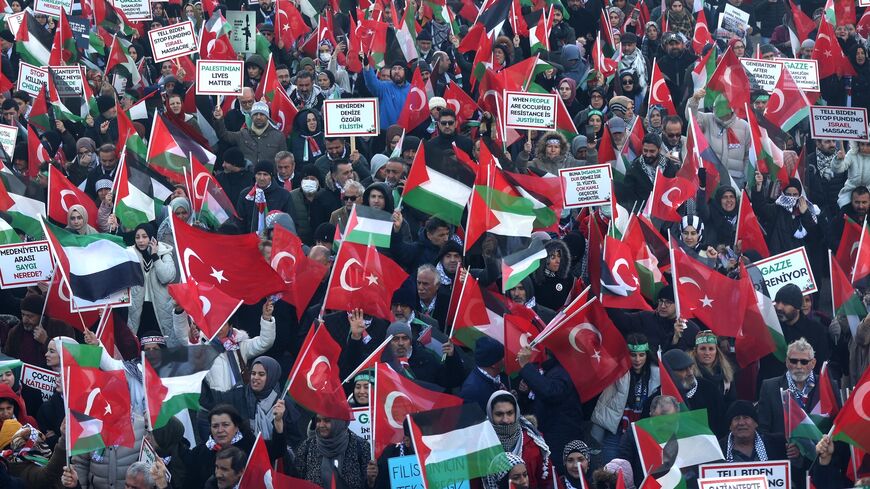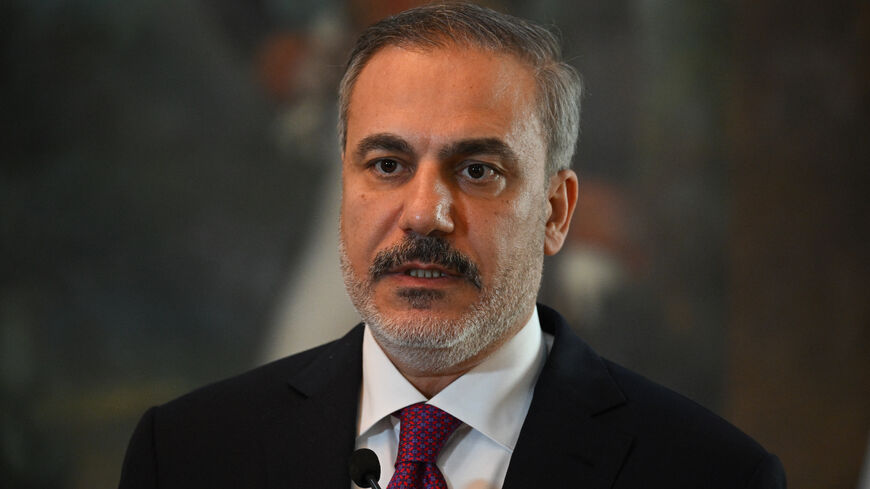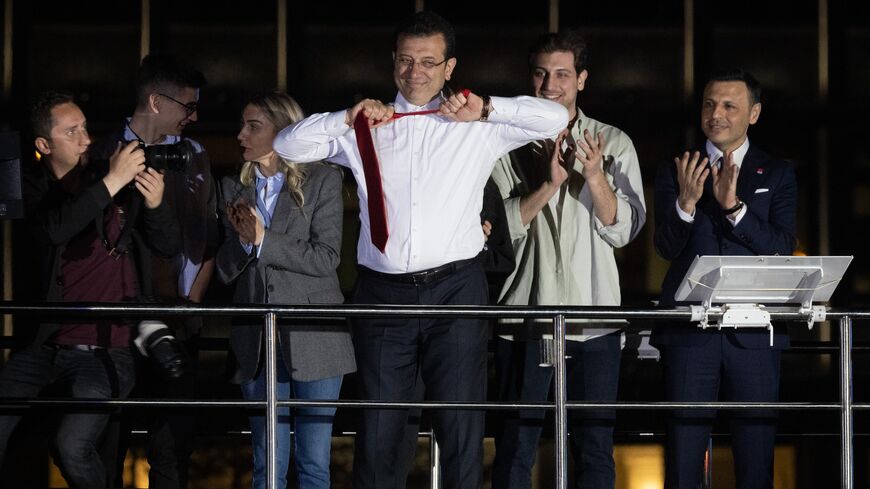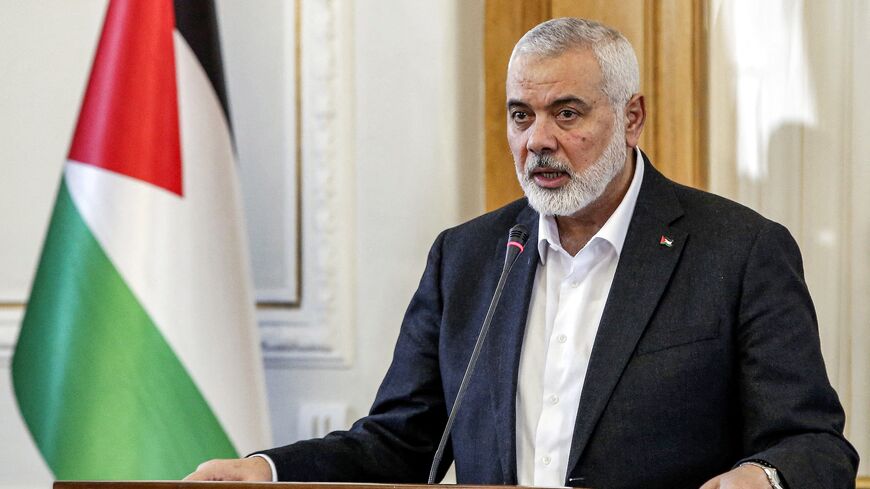Turkey restricts exports of 54 products to Israel until Gaza cease-fire
As Israel pledged to retaliate, analysts believe the move is aiming to allay growing dismay among Turkey's Islamists for the government’s refusal to sever trade ties with the Middle Eastern country over the Gaza conflict.
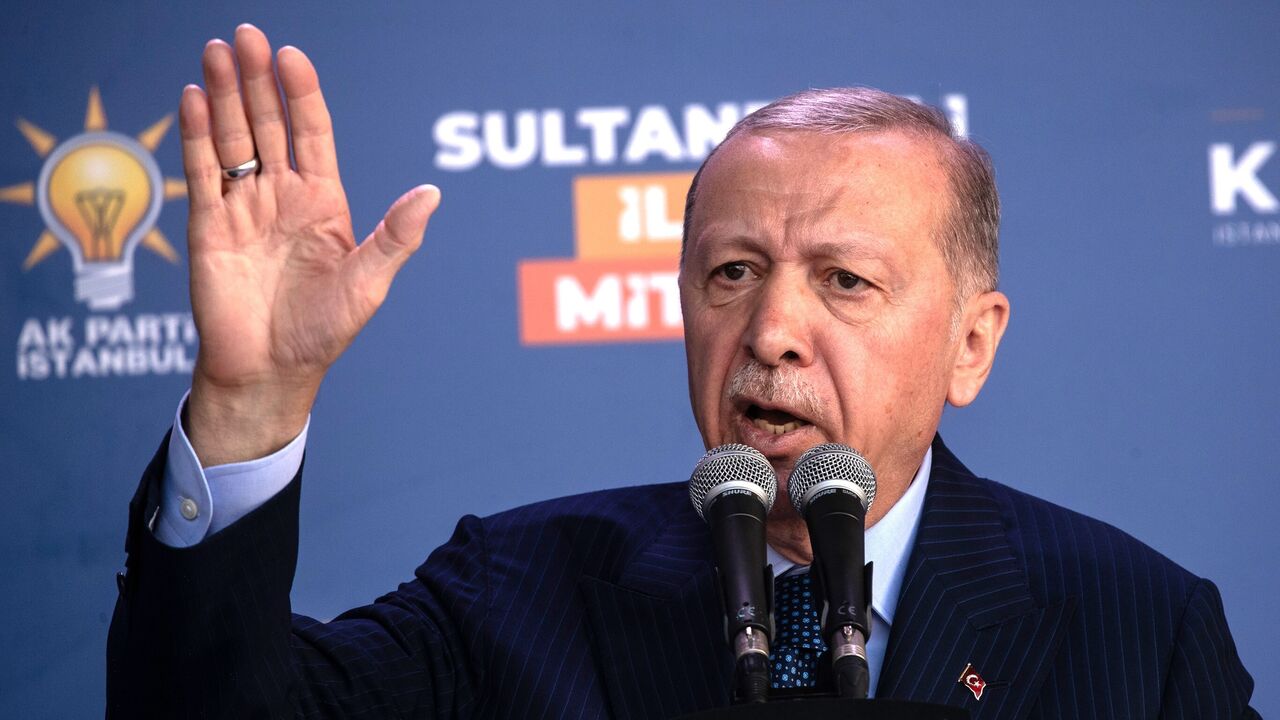
ANKARA — Turkey’s Ministry of Trade announced Tuesday export restrictions for 54 product groups, including mainly construction materials as well as jet fuel to Israel, amid growing calls from Islamist groups for the Turkish government to cut off trade ties with the Middle Eastern country amid the war in the Gaza Strip.
“The requirements of the restrictions will be implemented immediately,” the ministry said in an announcement. “The decision will remain in effect until Israel declares an immediate cease-fire in Gaza in line with its obligations under international law, and allows for a sufficient and uninterrupted flow of humanitarian aid to the Gaza Strip.”
The Trade Ministry added that the list solely covers the “first stage” of the restrictions. According to the list announced by the ministry, among the restricted product groups are, raw iron bars, aluminum, a wide range of copper products, concrete, steel, cement, iron-steel, electrical and fiber optic cables, granite, construction materials and marble.
The ministry did not detail whether the exports of these product groups have been entirely banned or what percentage of the products the restrictions account for. Minister of Foreign Affairs Hakan Fidan said Monday that Turkey would retaliate against the Israeli refusal to allow Ankara to provide aid to Gaza from the air by taking unspecified actions.
Gallia Lindenstrauss, senior research fellow at Israel's Institute for National Security Studies, described the decision as a significant step. “Usually, Ankara did not touch the commercial relations between Israel and Turkey,” she told Al-Monitor. Trade ties had remained isolated from political disagreements and even grown when Israel-Turkey relations were at rock bottom between 2010 and 2020, mainly due to disagreements over the Palestinian issue, before the regional powers restored their ties last year.
Reacting to the move, Israeli Foreign Minister Israel Katz hit back at Ankara Tuesday, promising to retaliate with countermeasures.
“Erdogan is once again sacrificing the economic interests of the people of Turkey for his support of the Hamas murderers in Gaza,” he wrote on the social media platform X. “Israel will not submit to violence and blackmail and will not condone the unilateral violation of the trade agreements. We will take parallel measures against Turkey,” he added.
Katz said that Israel's Foreign Ministry would prepare a long list of Turkish products that Israel will prevent from importing, adding also his country would take measures against Turkey’s potential breach of bilateral trade agreements.
Domestic political concerns
The move comes amid growing dismay among Turkey’s conservative and Islamist circles over ongoing Turkish-Israeli trade, with analysts concurring that the decision aims to placate this dismay among the country's conservatives.
Sinan Ulgen, a Turkey analyst and senior fellow at the Carnegie Endowment for International Peace think tank, told Al-Monitor that the government “had to implement this measure due to public pressure.”
Turkey-Israel trade, which has fallen since the outbreak of the Hamas-Israel war in October, has dominated the agenda ahead of the March 31 nationwide local elections, including for an ally of Turkish President Recep Tayyip Erdogan’s ruling party. The ties were a major campaigning theme of the tiny New Welfare Party (YRP), which secured four seats in the Turkish parliament in last year’s general elections by bypassing the country’s 7% electoral threshold through its alliance with the Justice and Development Party (AKP). The YRP fielded its own candidates in the local polls, defying calls from its allies. It secured two longtime AKP stronghold provinces and aided candidates from other opposition parties in winning votes in some small towns.
“This was one of the more salient points of the YRP’s campaign during the local elections, and it proved to be quite successful as a campaign point,” Ulgen said.
The ruling AKP suffered a historic setback in the polls, losing its status as the country’s leading party to the main opposition party based on their nationwide vote share.
Mehmet Rakipoglu, nonresident fellow at the London-based Dimensions for Strategic Studies, told Al-Monitor, “There were many people who didn’t vote because of this issue."
The dismay grew into outrage over the weekend when dozens of demonstrators, who called on the government to sever trade ties with Israel, were briefly detained in Istanbul’s central Taksim Square on Saturday.
The police's heavy-handed intervention in the demonstrations and detentions prompted further outrage from conservatives as well as opposition parties. Following a subsequent investigation launched by the Interior Ministry, several police officers were suspended over their treatment of the demonstrators.
While Turkish President Recep Tayyip Erdogan has been a vocal critic of the humanitarian catastrophe in the Gaza Strip, some of his Islamist critics have accused the Turkish government of not taking enough action against Israel, demanding that trade ties between the two regional powers be severed.
The Hamas-Israel war put Erdogan in the hot seat, breaking out at a time when Ankara was keen to restore its ties with Israel, but going against his long-held position as a leading champion of the Palestinian cause.
It remains unclear to what extent the government's restrictions would address those criticisms.
‘A step in the right direction, but not enough’
According to Rakipoglu, who has also previously criticized the government for not doing enough for Gaza, Tuesday's move "was a good step in the right direction but not sufficient."
“The statement says that the restrictions will remain in effect until a cease-fire is declared,” he said. “At least what I and many others were keen to see is an Israeli boycott until it is tried for war crimes or withdraws to the 1967 borders.”
Erdogan’s omission of mentioning the restrictions in a statement today marking the Islamic Eid holiday was also noteworthy, according to Rakipoglu.
“In the past, Erdogan used to announce such measures. Now, I think he has delegated the issue to the Foreign Ministry,” he added.
On the other hand, Rakipoglu also noted that the Turkish move would likely put pressure on several Muslim-majority regional powers to follow suit. Some even claimed that Turkey’s exports to Israel were aiding the country’s war efforts against Hamas — a claim denied by the Turkish government.
“Our country has not allowed the sale of any product or service that can be used for military purposes to Israel for a very long time,” the ministry said in Tuesday's statement. Lindenstrauss also finds those claims “exaggerated.”
“In practice, these were materials primarily used for civilian purposes,” she said.
Economic and legal ramifications
According to Ulgen, the goods covered by this export restriction make up roughly 40% to 50% of Turkey's exports to Israel, potentially causing a yearly loss of $2 billion to $2.5 billion.
"Turkey's trade with Israel is skewed in Turkey's favor," Ulgen said. "While exports are about $5 billion, imports are $2.5 billion."
"Now, this is not a huge sum in terms of Turkey's overall exports. However, it can have an impact on specific export companies and sectors."
For comparison, Turkey’s exports to the European Union, the country’s largest trade partner, exceeded $104 billion last year. Turkey's total exports reached $255 billion in 2023.
Assessing the list unveiled by the Turkey's Trade Ministry, Lindenstrauss said the restrictions will mainly affect the construction sector in Israel.
"Of course, there are replacements, but it will take time to find them and probably incur higher costs," she said.
Pointing out that trade between the two countries has been conducted through contracts between private Turkish and Israeli companies, Lindenstrauss also warned against legal ramifications, citing potential breaches of contracts.
"Somebody will have to bear the cost. So there will also be legal disputes between Turkey and Israel regarding this issue," she concluded.




